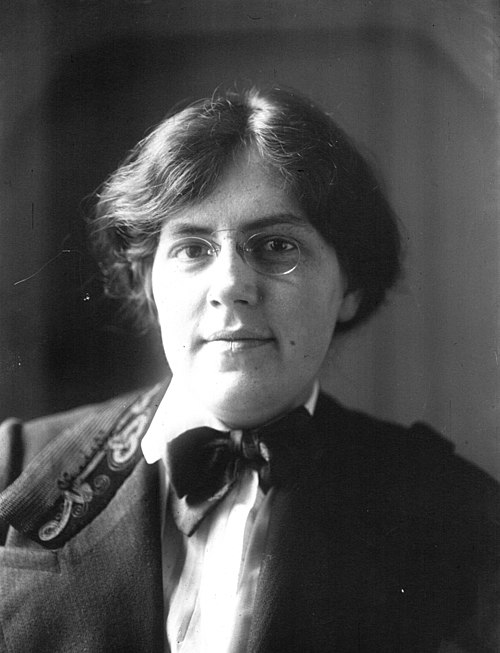Nadia Boulanger

The following contains excerpts from the book Nadia Boulanger (L. Rosenstiel).
Juliette Nadia Boulanger was a French music teacher, conductor and composer. She taught many of the leading composers and musicians of the 20th century, and also performed occasionally as a pianist and organist.
From a musical family, she achieved early honors as a student at the Conservatoire de Paris but, believing that she had no particular talent as a composer, she gave up writing music and became a teacher. In that capacity, she influenced generations of young composers, especially those from the United States and other English-speaking countries.
Boulanger taught in the U.S. and England, working with music academies including the Juilliard School, the Yehudi Menuhin School, the Longy School, the Royal College of Music and the Royal Academy of Music, but her principal base for most of her life was her family’s flat in Paris, where she taught for most of the seven decades from the start of her career until her death at the age of 92.
Boulanger was the first woman to conduct many major orchestras in America and Europe, including the BBC Symphony, Boston Symphony, Hallé, and Philadelphia orchestras. She conducted several world premieres, including works by Copland and Stravinsky.
Nadia Boulanger, whose composition students include Aaron Copeland, Igor Stravinsky, Elliot Carter, Virgil Thompson, Walter Piston, Leonard Bernstein, and many other highly respected twentieth-century composers, was called by the New Grove Dictionary of Music, “The leading music teacher of the twentieth century.” Her exceedingly high expectation for each of her students was that of complete mastery in understanding musical form and compositional technique.
At the age of 20, she won 2nd place in the highly esteemed “Prix de Rome” composition competition, and subsequently gave up composition to devote herself to teaching and performing. She became the first woman to conduct the Royal Philharmonic Orchestra of London as well as the Boston Symphony Orchestra. She was also an accomplished pianist, giving concerts that championed new music. We encourage students in our music school in Odessa, Texas to promote new creative ventures.
The book gives a concise look into the life-history of this great woman, beginning with her birth in Paris, France (1887). She was tutored by her father in composition at a young age. Working hard at her music, by the age of 7, she began to audit the “Conservatoire National”, taking music classes unofficially, where she excelled. As she continued to flourish in the artistic environment surrounding her, she had opportunity to study with and/or be influenced by great composers such as Gabriel Faure, Georges Enesco, Maurice Ravel, and Roger Ducasse. Her last year at the Conservatoire was 1904.
Continuing to study with Raoul Pugno, during the fall of 1904, Nadia began to teach and write music, ultimately winning 2nd place in the esteemed “Prix de Rome” for her composition “La sirene”. Her victory in the 1908 “Prix de Rome” competition was hailed by many as a symbol of women’s rights and international interest began to be given her from Compiegne to Rome to New York. Although at that time it was unacceptable for a woman to even consider directing an orchestra, her teacher Raoul Pugno encouraged her to pursue her dream. In 1912, she directed a “women’s composers concert” in Berlin in which one review wrote, “Mlle Boulanger directed the orchestra herself, and not the least attraction of the concert was that of seeing a woman fulfill the functions of Kapellmeister.” We believe that every student is unique and valuable in our music school in Odessa, Texas.
In 1913, she attended a concert of Stravinsky’s “Rite of Spring” in which the audience’s reaction was hostile and Nadia publicly came to his defense, which ultimately produced a life-long friendship with him.
Living through World War I, Americans and the American military were highly esteemed in France, and conversely, America had a deep respect for the art and culture of France, which opened a door for many American students to study music in France, and in particular at Fontainebleau, with Boulanger in her newly established “Conservatoire Americain”. Aaron Copeland was an example of some of her first students at the school. This school is an excellent example of what our music school in Odessa, Texas can become.
Her students found her to be motherly, gracious, and infinitely knowledgeable. She encouraged the habit of rigorous self-discipline and sharpened their critical faculties. Nadia had come to the conclusion that something momentous was about to happen to American music, and that the ‘New World’ was bursting with creative energy just waiting to be channeled. We encourage a high level of discipline in our music school in Odessa, Texas.
As a teacher, Nadia divided the characteristics of “modern music” into five categories- the enlargement of the concept of tonality, harmonic changes, rhythmic changes, experiments in orchestration, and “diction”. “I won’t say Forms at all”, she insisted, “because it seems that Forms don’t change very much. In the course of the History of Art they are modified a little, but they are, nevertheless, the things that change the least.”
She believed that a great artist either works within existing constraints, or creates new ones for himself to create within, in order for successful and lasting creativity to be brought forth. She believed that unbridled creativity could go nowhere without the constraints to work within. We encourage students in our music school in Odessa, Texas to both work within existing forms, as well as creating new ones.
Still giving instruction to her students as she had enough energy, as her health was failing, Nadia Boulanger passed away in 1979.
Nadia Boulanger was perhaps the single most influential person in modern 20th Century composition. Her passion to help others reach their potential was inspiring, and her influence is still reverberating in the creativity of modern composition. Her life provides a wonderful model to follow in the pursuit of shaping musicians for future generations.
We hope to follow her example in our music school in Odessa, Texas, as we endeavor to shape a new generation of artists.
